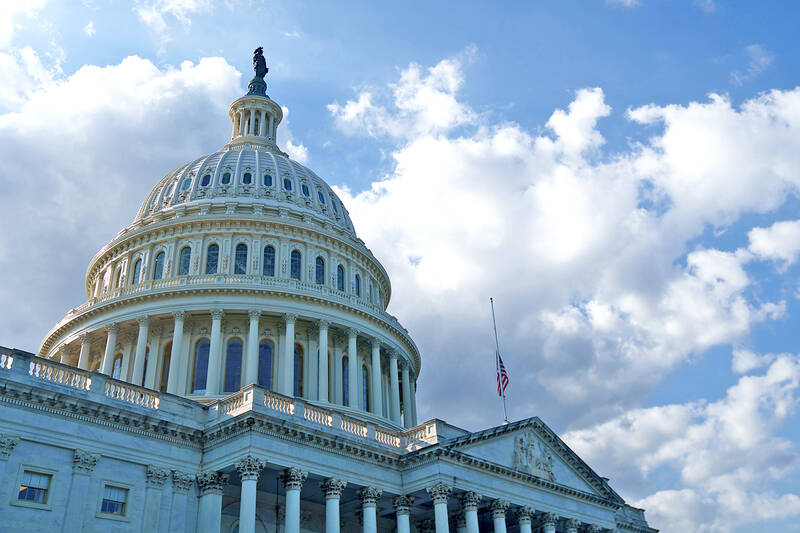The US House of Representatives on Thursday passed legislation giving the US Senate the power to approve WHO agreements, which also included an amendment supporting Taiwan’s full participation at the WHO.
The No WHO Pandemic Preparedness Treaty Without Senate Approval Act, which ensures that any pandemic-related convention of the WHO that attempts to bind the US must be ratified by the US Senate as a treaty, cleared the legislative floor by a bipartisan vote of 219-199.
The act was introduced by Republican US Representative Tom Tiffany to limit the WHO’s influence after the body received strong criticism for its handling of the COVID-19 pandemic and close ties to the Chinese Communist Party.

Photo: EPA-EFE
Also included in the bill is an amendment proposed by Republican US Representative Andy Ogles that offers a statement of US policy in support of “Taiwan’s full participation at the WHO.”
Ogle’s amendment passed with a unanimous vote of 403-0, with 34 abstentions.
“For far too long, we [the US] have allowed communist China to dictate the course of US foreign policy, as well as the agenda and membership of every major international organization, including the United Nations,” Ogles said.
“Decades upon decades of giving in to China has left Taiwan with fewer and fewer allies. In the late 1990s, over 30 countries recognized Taiwan. Now the number is down to 12,” he added.
Citing China’s continuing pressure campaign against Taiwan, the lawmaker said no one listened when the latter tried to “warn the WHO of possible human-to-human transmission of the coronavirus on Dec. 31, 2019,” adding that the world health body subsequently released a statement saying that there was no clear evidence of such a thing.
Due to this, the US lost weeks of preparation against the “ravaging effects of the COVID-19 pandemic,” all because “communist China told the world that under no circumstance could Taiwan be given a seat at the table” at the WHO, Ogles said.
His amendment in support of Taiwan was also echoed by Democratic House of Representatives Foreign Affairs Committee ranking member Gregory Meeks, who described Taiwan as a US ally, “a democracy and a critical part of the international community.”
However, Meeks was more reserved about Taiwan’s full participation at the WHO.
“I agree with Mr Ogle’s amendment, but I do think, however, that we should be precise and careful in how we talk about important policy matters,” he said.
“Taiwan should be contributing its expertise and participating as an observer in the World Health Assembly,” as in line with the US’ “one China” policy, he added.
The US House this week has passed several pro-Taiwan bills, including the Pacific Partnership Act, which aims to strengthen cooperation with Taiwan and the Pacific Islands Forum, and the Taiwan Conflict Deterrence Act, which aims to disincentivize Chinese aggression toward Taiwan by cutting Chinese leaders off from the US financial system if Beijing acts against Taiwan.

CHAOS: Iranians took to the streets playing celebratory music after reports of Khamenei’s death on Saturday, while mourners also gathered in Tehran yesterday Iranian Supreme Leader Ayatollah Ali Khamenei was killed in a major attack on Iran launched by Israel and the US, throwing the future of the Islamic republic into doubt and raising the risk of regional instability. Iranian state television and the state-run IRNA news agency announced the 86-year-old’s death early yesterday. US President Donald Trump said it gave Iranians their “greatest chance” to “take back” their country. The announcements came after a joint US and Israeli aerial bombardment that targeted Iranian military and governmental sites. Trump said the “heavy and pinpoint bombing” would continue through the week or as long

TRUST: The KMT said it respected the US’ timing and considerations, and hoped it would continue to honor its commitments to helping Taiwan bolster its defenses and deterrence US President Donald Trump is delaying a multibillion-dollar arms sale to Taiwan to ensure his visit to Beijing is successful, a New York Times report said. The weapons sales package has stalled in the US Department of State, the report said, citing US officials it did not identify. The White House has told agencies not to push forward ahead of Trump’s meeting with Chinese President Xi Jinping (習近平), it said. The two last month held a phone call to discuss trade and geopolitical flashpoints ahead of the summit. Xi raised the Taiwan issue and urged the US to handle arms sales to

BIG SPENDERS: Foreign investors bought the most Taiwan equities since 2005, signaling confidence that an AI boom would continue to benefit chipmakers Taiwan Semiconductor Manufacturing Co’s (TSMC, 台積電) market capitalization swelled to US$2 trillion for the first time following a 4.25 percent rally in its American depositary receipts (ADR) overnight, putting the world’s biggest contract chipmaker sixth on the list of the world’s biggest companies by market capitalization, just behind Amazon.com Inc. The site CompaniesMarketcap.com ranked TSMC ahead of Saudi Aramco and Meta Platforms Inc. The Taiwanese company’s ADRs on Tuesday surged to US$385.75 on the New York Stock Exchange, as strong demand for artificial intelligence (AI) applications led to chip supply constraints and boost revenue growth to record-breaking levels. Each TSMC ADR represents

Pro-democracy media tycoon Jimmy Lai’s (黎智英) fraud conviction and prison sentence were yesterday overturned by a Hong Kong court, in a surprise legal decision that comes soon after Lai was jailed for 20 years on a separate national security charge. Judges Jeremy Poon (潘兆初), Anthea Pang (彭寶琴) and Derek Pang (彭偉昌) said in the judgement that they allowed the appeal from Lai, and another defendant in the case, to proceed, as a lower court judge had “erred.” “The Court of Appeal gave them leave to appeal against their conviction, allowed their appeals, quashed the convictions and set aside the sentences,” the judges